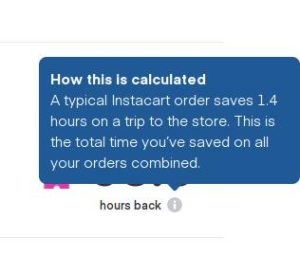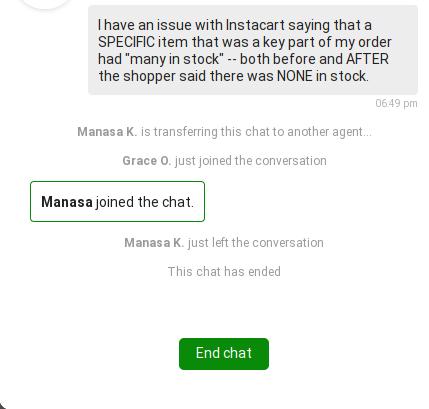While I have had my difficulties with customer service in the past — most notably trying to reach an actual human at Google several years back — I have rarely had such an unrepentantly bad experience as I had today with Instacart’s customer service and the bait-and-switch that I experienced with their website.
As a result, I would be extremely cautious about giving Instacart — which bragged of US$2.5 BILLION in revenues in 2022 — any money as a consumer or as an investor in their probable IPO later this year.
Going From Annoyance To Anger Because Of Horrible Instacart Customer Service
I have been using Instacart during the pandemic, and particularly since I started working third shift. Sometimes there are replacements, sometimes things aren’t in stock, and that’s annoying, but doable. As an Instacart+ member, I will also sometimes specifically make an order to get one item, and then add on other things that would be "nice" to get.
Caffeine — specifically, generic diet soda from Aldi — is one of those central, key items for me. That particular item was "material" (using the FTC definition here) to my decision to make an order at all today. So I was pleased to see that Instacart’s website listed that soda as "many in stock."

Since there were "many in stock," I made sure I selected that specific item only — because that item is half the price of the closest brand-name competitor.
I was surprised to get out of the shower to find that the shopper had refunded the item, saying that there were none in stock.

I double-checked with the shopper and I re-examined Instacart’s website, which still listed there as being "many in stock." Instacart’s website still claims that there are "many in stock" as I write this. So I decided to contact Instacart and ask what led to that disconnect.
And that, friends, is where this all started to spiral.
 Instacart’s entire business model is based on the idea that you give them money so that they can make things more convenient for you.
Instacart’s entire business model is based on the idea that you give them money so that they can make things more convenient for you.
Finding out that the main (or "material") reason you made an order at all — something you were assured is availabe — turns out to not be available seems to violate the whole value proposition of the company.
The first customer support person I chatted with said that it was the store’s fault — something that was repeated time and again by Instacart support personnel. I was told that the sole resolution was that they would "escalate it." That was an unacceptable "resolution" for me. I’d just been burned by trusting Instacart’s website, so saying that I should just trust that it would be escalated and handled by someone at Instacart, sometime in the future, seemed like less of a resolution of my issue and more of a "make the guy go away" kind of thing.
It got worse from there. I asked the representative to not disconnect from the chat while I checked the rest of the (just delivered) order. Almost immediately, that representative handed me off to someone else and disconnected from the chat. That second representative did not review the prior chat. I said:
"I have an issue with Instacart saying that a SPECIFIC item that was a key part of my order had ‘many in stock’ — both before and AFTER the shopper said there were NONE in stock."
That agent did not respond, immediately transferred me to someone else, who then immediately closed the chat competely.

So I called.
As an aside, I thought it very interesting that while Instacart seems to think it’s cool to just say they are recording those conversations without giving you an opportunity to opt out of that recording, their representatives get really bent out of shape when you say that you are also recording the conversation for quality control purposes.
I outlined the situation to the next representative I spoke to ("Toby", as best I could make out), including my increasing anger at having been "hung up on" in the help chat as poor customer service.
Toby also tried to deny that Instacart had any responsibility for the listings on the website, saying that those listings were up to the stores in question.
I asked Toby point-blank if it was Instacart’s official stance that the listings on the website may not reflect what is actually available. Toby denied that, then again tried to say that what was or was not available is not Instacart’s responsibility and that substitutions were available for that reason.
Bait And Switch
It’s worth taking a moment to really dwell on this. Over and over again, the customer service representatives at Instacart were consistent about saying that Instacart had no responsibility for what was or was advertised as being available on Instacart’s website. Across the board, Instacart employees asserted that it was entirely the fault of the supermarket.
Here’s the rub, though. I did not make a purchase from that supermarket. I made a purchase from INSTACART. Saying that I could have chosen a substitution that cost twice the price sounds after advertising a lower-cost item being readily available comes pretty damn close to the definition of "bait-and-switch":
Bait and switch is a fraudulent activity whereby a company advertises goods at an incredibly low price with the aim of substituting for them with inferior or pricier alternatives at the time of purchase … instead of getting the item initially advertised – the item that “baited” them to come and shop, the company attempts to do a switch and sell the consumer an entirely different product. In many instances, the item the retailer is trying to sell is either of inferior quality or more expensive than the advertised product. Either way, it is an act of fraud that is punishable in a court of law.
Unfortunately, once the customer visits the store, he is confronted with … [t]he tablet or other advertised product is out of stock, but the customer is informed that other, similar options are available – for a higher price.
The FTC’s definition is even more damning:
According to the FTC’s Deception Policy Statement, an ad is deceptive if it contains a statement – or omits information – that:
- Is likely to mislead consumers acting reasonably under the circumstances; and
- Is "material" – that is, important to a consumer’s decision to buy or use the product.
I then asked Toby to tell me what Instacart was going to do to keep me as a customer instead of canceling my Instacart+ subscription immediately. I was told, again, that the only resolution on the table was to trust Instacart to resolve the problem in the future.
And then it got even worse.
When I said that I wished to cancel my subscription and recieve a prorated refund for the nine months left on it — approximately US$75 — I was transferred to another representative, who told me that a refund was not possible. They could cancel my account, but I would just have to forfeit the remainder of the subscription.
I’m not keen on paying for things that I’ve canceled.
When I said that I would wait until a weekday in the hopes that someone with more authority would be available, that representative — who repeatedly interrupted and talked over me — hung up on me.
It could have gone so differently.
Here’s a few things to keep in mind.
First, I would be writing a very, very different post if Instacart’s customer service had been competent or empathic.
In 2007, I wrote an entire article in an advertising magazine about how Amazon’s customer service exceeded my expectations. While Amazon has since been exposed for a lot of bad behind-the-scenes workplace conditions for workers, that kind of good customer service also has done a lot for the company. As I wrote in that article,
It is not just common sense that a customer’s trust is good for business. In 2001, a study was published in the International Journal of Service Industry Management. That study showed that customers who trusted a company not only think more favorably about it, but they began to talk about that company to their friends. Customer trust leads to both future sales and honest word-of-mouth advertising.
If I’d been offered anything — from "we’ll give you $16 credit with us for your next soda" to "here’s the $75 prorated part of your subscription you did not use" — I would feel neutrally or even positively about Instacart.
Instead, I’m annoyed, angry, and seriously wondering how long Instacart is going to survive in a more-competitive environment with this kind of arrogant customer service.
Putting It In Perspective
The fact that this is a small amount of money is exactly why I am so irritated. There is absolutely no reason for this to have gone this way, unless Instacart is either hopelessly arrogant or is so cash-strapped that my $75 somehow matters to a multi-billion dollar company.
Instacart was founded a decade ago, with an annual revenue in 2021 of US $1,800,000,000. The company is currently led by CEO Fidji Simo and COO Asha Sharma, and recently told employees "that revenues jumped more than 50% in the final quarter of 2022, while gross profit climbed more than 80%," according to an internal memo cited by the WSJ in February. Other sources, according to reporting in PYMNTS, told the WSJ "that Instacart’s full-year revenue rose 39% to around $2.5 billion for 2022, while it processes $29 billion in overall sales, a 16% increase from 2021." Instacart initially planned an IPO in 2022, but delayed that plan, and is still considering that IPO in 2023 despite the Fed increasing interest rates and a historically bad year for IPOs in 2022.
For a company whose entire existence is based around the idea of convenience and customer service, you would think that US$75 — or 0.003% of Instacart’s two and a half BILLION dollars of revenue from last year — would be a small thing.
Instead, Instacart’s policies and godawful customer service have changed me from a customer who willingly paid for the service to one who wants nothing to do with them — but is more than willing to write 1700 words detailing exactly how messed up their experience, from the bait-and-switch on the website (y’all have had a decade to figure this out!) to the scripts the CS reps had to read from (Chief Marketing Officer Laura Jones may wish to really reflect on those), to the corporate policy about not offering prorated refunds to aggreived customers.
I can only assume that I am not the only person to have this experience with the company. It’s far more likely that I am the tip of the iceberg, and just the one writing about it where other consumers, investors, and even the C-suite at Instacart itself may find it.
Given this experience, I would be extremely cautious about giving Instacart any money — either as a consumer or as an investor.
Featured Image by ElasticComputeFarm from Pixabay
